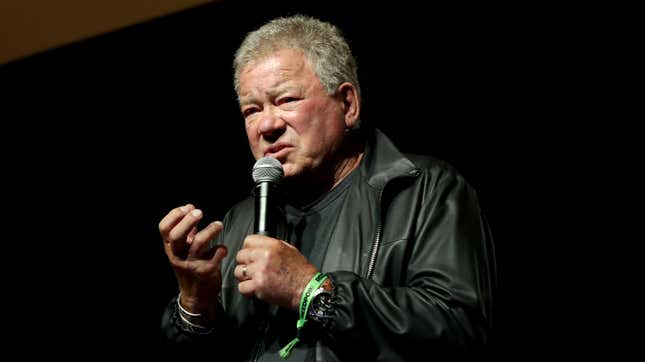
Ahead of the premiere of his documentary at SXSW, veteran actor William Shatner has shared a lot of notions on death through a deeply existential lens. The 91-year-old actor will soon appear in the documentary You Can Call Me Bill, which he made with director Alexandre O. Philippe. For him, he says documenting his career and life has become a matter of importance as he stares down the barrel of death.
“I’ve turned down a lot of offers to do documentaries before,” Shatner tells Variety. “But I don’t have long to live. Whether I keel over as I’m speaking to you or 10 years from now, my time is limited, so that’s very much a factor. I’ve got grandchildren. This documentary is a way of reaching out after I die.”
In his older age, it seems the prolific actor has realized that memories fade and eventually all of us will have to leave behind everything we’ve collected throughout our lives as our bodies turn to rot. Even if we’ll be able to go chat with an AI version of Shatner long after he’s gone, that won’t stop his physical form from decomposing, making it impossible to wear all those suits he has.
“The sad thing is that the older a person gets the wiser they become and then they die with all that knowledge. And it’s gone. It’s not like I’m going to take my ideas or my clothing with me,” Shatner explains. “Today, there’s a person going through some of my clothes in order to donate or sell them, because what am I going to do with all these suits that I’ve got? What am I going to do with all these thoughts? What am I going to do with 90 years of observations? The moths of extinction will eat my brain as they will my clothing and it will all disappear.”
And what does he think happens when it’s time to go?
“There was a time when actors—and I include myself in this—would portray death by falling to the ground and your eyes would flicker and you’d slump around and then you’re dead,” Shatner explains. “That’s not how you die. This is how you die [Shatner’s eyes go wide abruptly and his breath stops]. See? I’m dead.”
He continues, “Ever put a dog down? When I have to put a dog down and I’m at the vet, I cup my dog’s head and I say, ‘I’m with you baby, I’m with you.’ And the injection goes in and the dog looks at me with love, and that’s it. You don’t know they’re dead. That’s how you die. It’s abrupt. My wife’s brother walked out of the living room and into the bedroom. There was a thud. His wife walked in, and he was dead. Death comes anew to all of us.”
The making of the documentary is far from Shatner’s first time thinking about what all happens when it ends. In 2015, following the death of Shatner’s longtime Star Trek co-star Leonard Nimoy, conversation sparked when Shatner missed his funeral to speak at a fundraising event for the Red Cross. When reflecting on the event nearly 8 years later, Shatner offers some interesting musing on legacies and the communal memory of Cary Grant.
“I chose to keep my promise and go to Mar-a-Lago instead of the funeral, and I said to the audience, ‘People ask about a legacy. There’s no legacy. Statues are torn down. Graveyards are ransacked. Headstones are knocked over. No one remembers anyone. Who remembers Danny Kaye or Cary Grant? They were great stars. But they’re gone and no one cares.’” Shatner says. “But what does live on are good deeds. If you do a good deed, it reverberates to the end of time.”
Shatner’s been a little more existential since his trip up into outer space on one of Jeff Bezos’ Blue Origin expeditions. It’s spurred him to get more involved in environmental activism as he thinks about humanity in a greater sense.
“When I came out of the space ship I was crying, just sobbing, and I thought why am I crying? What’s going on? I’m in grief. What am I grieving about?” Shatner says. “Oh shit, I’m grieving about the world, because I now know so much about what’s happening. I saw the Earth and its beauty and its destruction. It’s going extinct. Billions of years of evolution may vanish. It’s sacred, it’s holy, it’s life and it’s gone. It’s beyond tragic. We stupid fucking animals are destroying this gorgeous thing called the Earth. Doesn’t that make you angry? Don’t you want to do something about it?”
Well, happy Friday everyone.